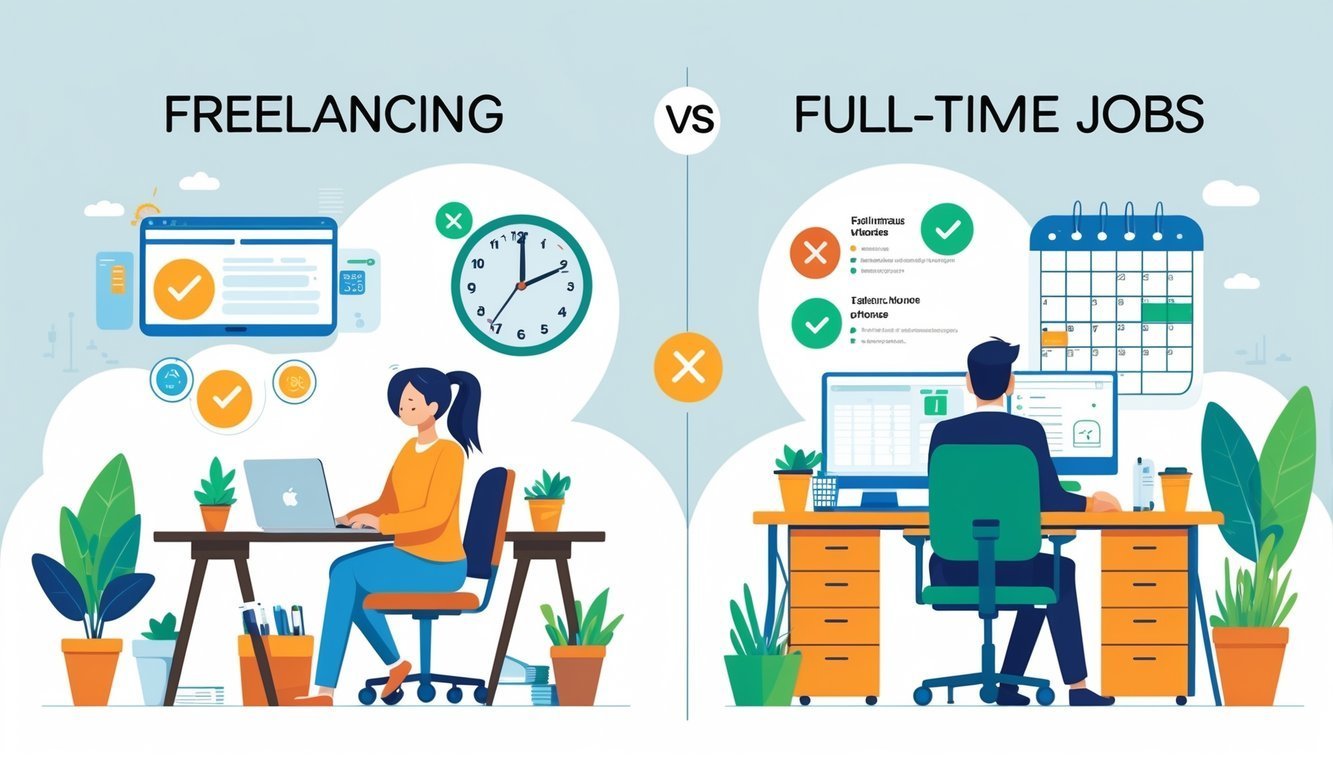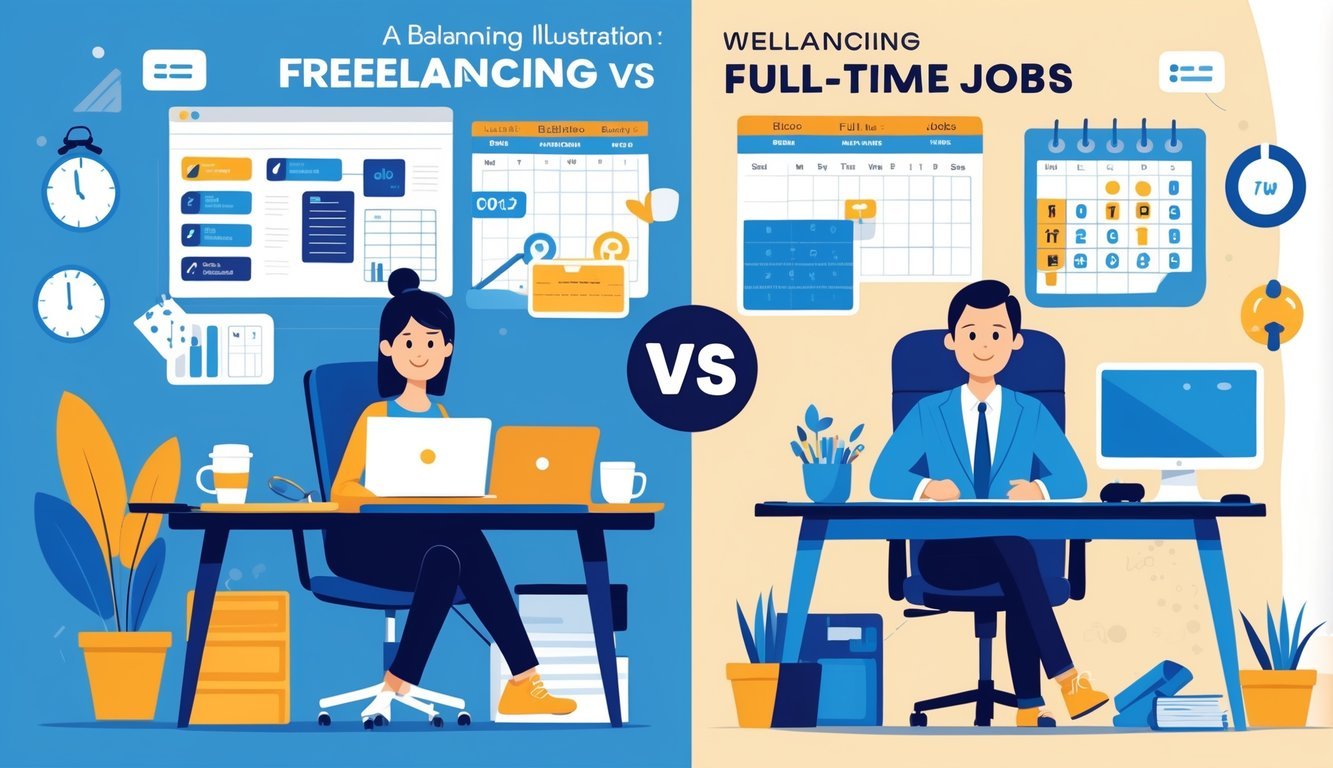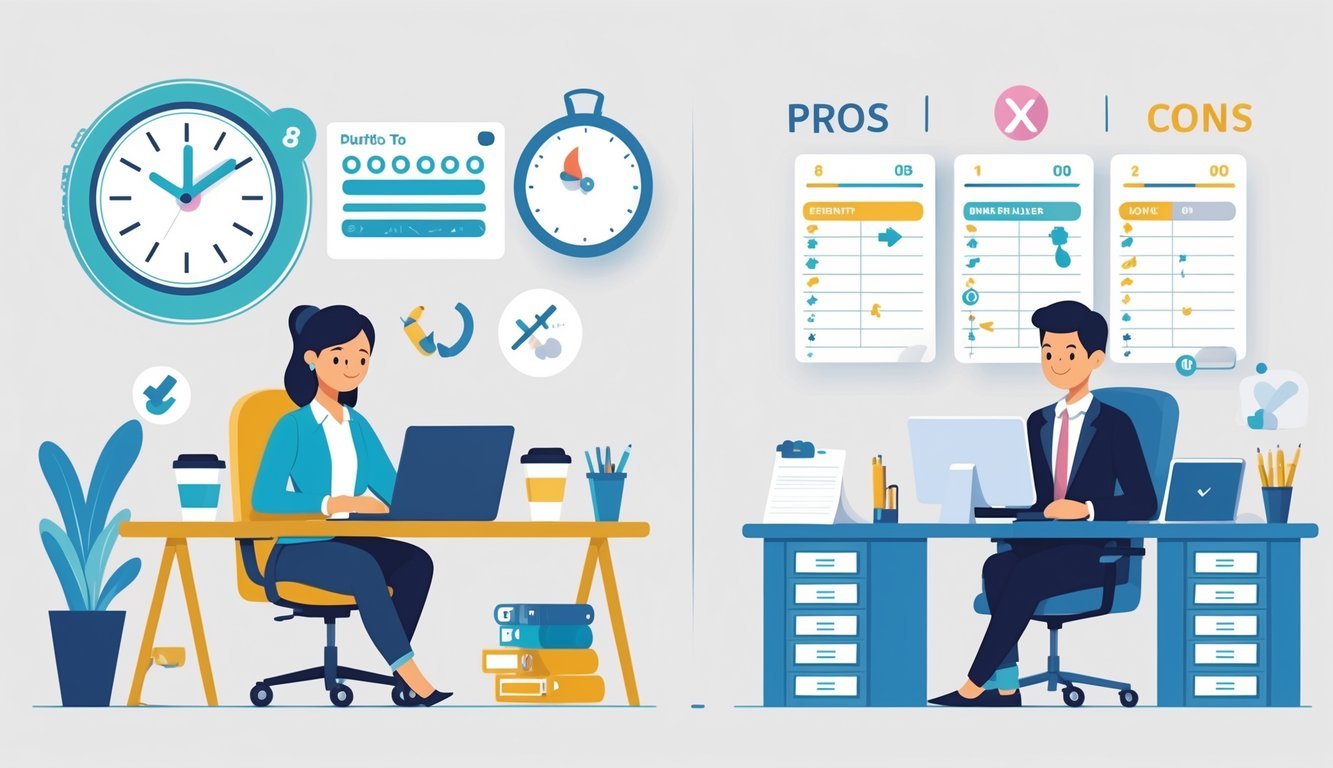PsychNewsDaily Publishers
100 Summit Drive
Burlington, MA, 01803
Telephone: (320) 349-2484
PsychNewsDaily Publishers
100 Summit Drive
Burlington, MA, 01803
Telephone: (320) 349-2484
Choosing between freelancing and full-time employment involves assessing flexibility, income stability, work-life balance, and benefits, influencing career paths and personal goals.

Picking between freelancing and a full-time job can feel overwhelming. Both paths come with their own perks and headaches, and they shape your work life, income, and freedom in different ways.
Getting a real sense of the pros and cons might help you figure out what fits your life and goals better.
Freelancing gives you flexibility and independence. You get to choose your hours and pick your projects.
On the flip side, full-time jobs come with steady pay and benefits, but you usually have less say over your schedule. It’s a trade-off, right? Knowing these differences can point you toward what actually works for you.
Let’s break down eight important pros and cons of freelancing versus full-time work. You’ll get a clearer picture so you can make a choice that feels right.

When you’re choosing between freelancing and full-time work, you have to think about how much control you want, how steady you need your income, and how much you care about keeping work and personal life apart.
Each path brings a different balance of freedom, risk, and support.
Freelancers set their own hours and pick their clients. You decide when and where to work.
You’re the boss, so you call the shots about projects and deadlines.
Full-time employees usually follow fixed hours and company rules. Someone else decides your tasks and work location.
You trade some independence for more structure.
If you love managing your own day, freelancing gives you that freedom. But if you like clear routines, a regular job might feel more comfortable.
Full-time jobs give you steady paychecks and benefits like health insurance or paid time off. Planning your finances becomes simpler.
Freelancers deal with irregular income. You have to hunt for clients and sort out your own taxes and benefits.
If you want predictability and company support, full-time work feels safer. If you don’t mind handling your own business and living with some uncertainty, freelancing can work out.
Freelancers usually have more control over their work-life balance. You pick your hours and set up your workspace.
But honestly, it’s easy to blur the line between work and personal life. Without set hours, you might end up working way too much.
Full-time jobs come with clearer boundaries. You have set hours and scheduled breaks, so it’s easier to separate work from home.
That structure can feel limiting, though.
If you want to keep work and life separate, a regular job helps. If you’re disciplined with your time, freelancing can give you a better balance—but it takes effort.

Your choice between freelancing and a full-time job shapes your income, daily routine, benefits, and career path. You’ll notice big differences in how you get paid, manage clients, and carve out personal time.
Each option brings its own challenges and perks for your professional life and finances.
Freelancing can pay more if you find steady clients and set good rates. You control your prices and can take on extra projects to boost your income.
But there’s a catch—your income isn’t steady. Some months are busy, others are slow, so you have to budget carefully.
Full-time jobs pay a consistent salary. That regular paycheck makes it easier to plan your expenses.
You might not make as much as top freelancers, but you skip the stress of chasing payments. Some jobs offer bonuses, though they’re usually smaller than what a freelancer could make during a good month.
Freelancers have to go out and find clients, often using websites and apps. Marketing yourself takes time and energy.
You’ll probably juggle multiple clients and projects at once, which means managing deadlines and expectations.
Full-time workers don’t worry about finding work. You focus on your assigned tasks for one employer.
That’s simpler, but maybe a little dull if you crave variety.
Full-time jobs usually come with benefits like health insurance and retirement plans. Your employer often covers a chunk of these costs, which is a relief.
Freelancers handle their own insurance and retirement savings. You pay out of pocket and have to plan ahead.
Sorting out healthcare and retirement on your own can get expensive and complicated.
Freelancers often build a diverse portfolio by working on different projects. That variety helps you pick up new skills and stay adaptable.
You’re responsible for keeping your skills sharp so you stay in demand.
Full-time jobs might offer more structured training and a clear career path. You could get steady skill growth, but sometimes the work feels repetitive.
Employers usually pay for professional development programs.
Full-time jobs usually include paid sick leave and vacation days. You can take time off and still get paid.
Freelancers don’t get paid time off. If you’re sick or want a break, you don’t earn money unless you plan ahead.
Self-management is key to avoid burnout and keep your work-life balance in check.
Freelancing means you can work from home, wear pajamas, and set your own hours. That freedom can boost motivation.
But let’s be real—it’s easy to procrastinate or work late to meet deadlines.
Full-time jobs give you set work hours and a clear divide between work and home life. Routines can help, but sometimes the schedule feels rigid or a bit dull.
Freelancers often join professional groups to network and find clients. Building relationships is essential for referrals and landing new gigs.
Full-time employees usually network inside the company or at industry events. Your career growth might depend on connections with coworkers and bosses instead of outside clients.
Freelancers need solid financial planning. You track your own income, expenses, and taxes.
Tools like Yahoo Finance or analytics apps can help you keep tabs on your money.
Full-time employees get a fixed paycheck and automatic tax withholding. Managing finances is usually simpler since your employer handles most of the paperwork.

Maybe you’re wondering about the upsides of full-time jobs, what kind of flexibility freelancing actually brings, or how each option impacts your daily life and career. The financial risks and social side matter too.
Full-time jobs give you a steady paycheck and usually benefits like health coverage and paid time off. Your schedule tends to be more predictable, which makes planning easier.
Freelancing lets you set your own hours and work from almost anywhere. But with that freedom comes less income security.
Full-time jobs offer more predictable pay but less flexibility.
Freelancing can give you more control over your schedule, which might help your work-life balance. Still, finding clients and meeting deadlines can sometimes add stress and eat into your free time.
Freelancers deal with less stable income and have to handle their own taxes and benefits. Full-time jobs come with steady pay and benefits, but there’s usually less room for quick financial growth.
Full-time jobs often have clearer promotion paths and regular raises. Freelancers can grow by picking up new clients and skills, but you have to drive your own advancement.
Full-time jobs usually give you daily interaction with coworkers. You get to build relationships almost without thinking about it.
Freelancing feels a lot lonelier sometimes. You really have to put in the effort to network, whether that’s online or at events.